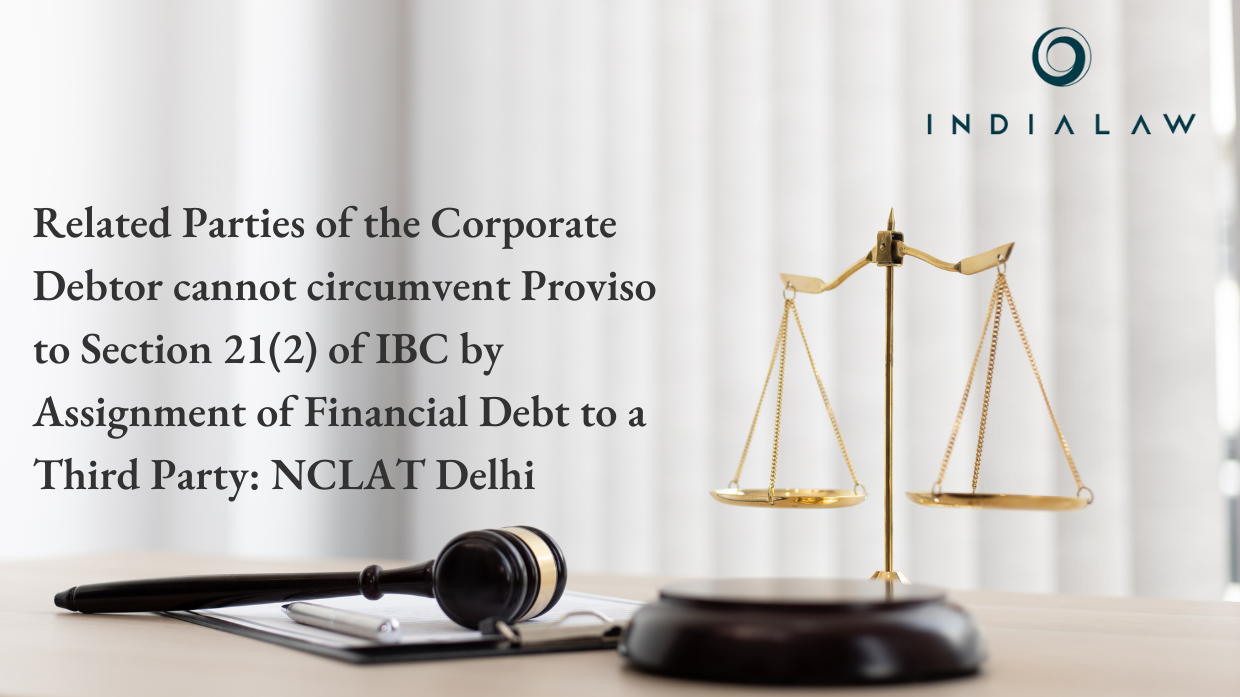Related Parties of the Corporate Debtor cannot circumvent Proviso to Section 21(2) of IBC by Assignment of Financial Debt to a Third Party: NCLAT Delhi

Introduction
In the case of Peanence Commercial Pvt. Ltd. & Ors. v. Mamta Binani (RP for Rolta India Limited)[1], the Hon’ble NCLAT upheld the decision of NCLT Mumbai Bench stating that merely assignment of financial debt by a related party to another party on an arm-length transaction does not mean the assignee should be treated as a non-related party.
Table of Contents
Brief Facts of the Case
Rolta India Limited was admitted into CIRP by Order dated 19.01.2023. Rolta Private Limited (Hereinafter “Appellant 2” filed their claim with the Resolution Professional (Hereinafter “RP”). The RP admitted the entire claim amount of Appellant 2, however, since the Appellant was a related party, they were not given any voting rights or representation in the Committee of Creditors by the RP.
On 15.01.2024, Appellant 2 entered into an MoU with Peanence Commercial Pvt Ltd. (Hereinafter “Appellant 1”) for assignment of debt for one-time consideration of Rs 50 crores on as is where is basis. Appellant 2 sent a letter to the RP for the approval of the assignment dated 15.01.2024. The RP informed that the RP has no authority or jurisdiction to grant approval for the Deed of Assignment and since the nature of the debt hasn’t changed, no voting rights would be available to Appellant 1. Thereafter, Appellant 2 filed an IA no. 724 of 2024 before the Mumbai Bench of NCLT, praying to admit the Appellant 1 as a non-related party in the CoC. The Hon’ble NCLT rejected their prayer and hence the Appellants filed an appeal.
Contentions of Both Parties
The counsel for the Appellants contended that the assignment deed could not be refused to be acknowledged as Peanence Commercial is not a related party and no disqualification is attached to the assignee to be part of the CoC. Moreover, the assignment consideration of Rs. 50 crore is an arm-length transaction and the Hon’ble NCLT had not correctly appreciated the ratio of Supreme Court in Phoenix ARC Pvt. Ltd. v Spade Financial Services Ltd[2].
The counsel for the Respondents contended that the MoU relied on by the counsel for the Appellants indicate that no assignment agreement has taken place between Appellant No. 1 & 2. The MoU is only an agreement to enter into an assignment in future. Further, the purpose behind the assignment is to put an entity in the CoC by the Rolta Pvt. Ltd. since it cannot be a part of the CoC itself, being a related party.
Decision of the NCLAT
The Hon’ble NCLAT in its order carefully examined the contents of the MoU and noted that ‘Purchase Consideration Due Date’ clause of the MoU clearly laid down that date to pay the consideration will be immediately upon obtaining the approval of the RP of the Borrower recognising the Assignee as a non-related party. In other words, the Assignment agreement would only come into existence upon the recognition of the Assignee as a non-related party and thus getting voting rights in respect of the debt in the CoC. The NCLAT upheld the NCLT’s opinion that the assignment which was effective only upon the confirmation from the RP and thus such contingent agreement cannot be considered a bona-fide transaction.
The NCLAT considered the relevant paragraphs of Phoenix ARC Pvt. Ltd. v Spade Financial Services[3] where the Apex Court held that the proviso to Section 21(2) would apply to cases where the financial creditor ceases to become a related party solely with the intention of participating in the CoC and sabotage the CIRP.
Emphasising on the fact that the assignment is contingent on approval by the RP that the Assignee shall be given a seat in the CoC, the court held that real intent of the assignment to obtain a seat in the CoC and to create hurdles and delay in CIRP of the Corporate Debtor. Thus, the court dismissed the appeal, stating that it did not find any error in the reasoning of NCLT rejecting the I.A.
Conclusion
In the present case, the agreement was a contingent upon the condition that the assignee shall be awarded the status of non-related party through the assignment of financial debt, this clearly indicates that the sole purpose of the assignment was to circumvent the proviso to Section 21(2) and obtain voting rights in respect of the financial debt. This is one of the ways in which financial creditors related to the Corporate Debtor often try to obtain voting rights in the CoC. However, through the present order of the NCLAT, it has clarified that any assignee cannot be treated as a non-related party in case of assignment of financial debt by a related party. This is an important position of law as had the court allowed such an assignment deed, the objective behind the proviso to Article 21(2) would be overlooked. It can be inferred through the order that it is important for the court to consider the intent and objective of the assignment deed. In cases where the intent is to solely obtain a seat in the CoC, such as in this case, it would provide a convenient option to the financial creditors to circumvent the proviso to Section 21(2) and indirectly manipulate the decisions of the process.
[1] Company Appeal (AT)(Insolvency) No. 905 of 2024
[2] (2021) 3 SCC 475
[3] (2021) 3 SCC 475
By entering the email address you agree to our Privacy Policy.



